Online and technology-facilitated abuse
An experience of online and technology-facilitated sexual abuse can be just as devastating as an experience of abuse that has happened offline.
What is online and tech-facilitated abuse
Online and technology-facilitated abuse is abuse that happens through the internet via phones, computers, and tablets.
Online and tech-facilitated abuse can be committed by someone you know or by a stranger you have never met. It can happen anywhere online, including (but not limited to):
• Social media
• Text messages and messaging apps
• Emails
• Online chat rooms
• Online gaming voice chats
• Live streaming sites • Smart devices.
Anyone can be victim-survivor of online and tech-facilitated abuse.
What are the different types of online abuse?
Cyberbullying: a type of bullying that happens online. It can include receiving threatening or abusive messages, creating or sharing videos of someone, exclusion from games or online activities or creating fake accounts to embarrass or upset someone.
Cyberstalking: persistent unwanted contact from another person online.
Emotional abuse: any type of abuse that involves the continual mistreatment of someone. It can involve trying to scare, humiliate, isolate or ignore someone. This can be done online as well as in person.
Grooming: children can be groomed online. This is when someone builds a relationship with a child in order to sexually abuse, exploit or traffic them. Someone might pretend to be a mentor/mentee, authority figure or make the child believe that they are in a romantic relationship. Grooming can be perpetrated by someone a child knows in person or met online. A groomer may pretend to be younger than they are, use fake accounts and pictures, buy gifts online or provide advice or understanding. Grooming often involves isolating the child from friends, family and creating a dependency on the perpetrator.
Adults can also experience online grooming.
The signs of grooming are often hidden and hard to identify due to the online nature of the situation, but some signs include:
- Secrecy around time spent online
- Having friends or a relationship with an older person
- Having money or new things they cannot explain
- Sexualised behaviour, or using language or an understanding of sex that is not consistent with their age
- Spending unexplained time away from home or going missing.
Childline offers support through email, phone calls or 1-2-1 counselling.
Ann Craft Trust has more information on adult grooming.
Sexting: where someone sends a sexually explicit photo or video of themselves or others, or sends sexual messages. If this is done without consent, it is illegal and the perpetrator can get up to a 2 year prison sentence.
Online child sexual abuse: a child or young person may be tricked into or forced to make, view or share child abuse photos or videos or participate in sexual activities on chats online. Creating or sharing any sexual images of a child under 18 is illegal, even if the person sharing is under 18.
Sexual exploitation: a type of sexual abuse where a child or young person is coerced into creating and sharing sexually explicit content or having sexual chats online.
The Child Exploitation and Online Protection (COEP) Safety Centre offers support for children and young adults facing sexual abuse online.
Domestic online and tech-facilitated abuse: when someone stalks, harasses, threatens or controls their partner or ex-partner online or via smart devices.
This can happen in lots of ways:
- Using your social media accounts without your permission
- Posting information about you online or by text/messenger
- Creating a profile page without your permission
- Sending you threatening messages
- Sending threatening messages to other people whilst pretending to be you
- Posting photos of you without your consent. This is a form of image based abuse (also known as revenge porn)
- Using spyware on your devices, in your home or personal belongings to track you
- Taking away your control of smart home devices such as cameras, lights, thermostats (or using smart home devices to monitor or control you)
- Controlling your bank accounts.
The National Domestic Abuse Helpline offers free, 24-hour support for those experiencing domestic abuse.
Refuge have a dedicated online and tech-facilitated abuse team and a range of resources that provide support and online safety tools.
Image-based abuse: when an intimate image or video is shared, or is threatened to be shared, without the consent of the person in that image or video, with the intent to cause that person distress or harm, also known as ‘revenge porn’. This can include digitally altered images, also known as ‘deepfakes’. AI is increasingly being used to create ‘deep-fakes’.
Often perpetrators of this offence are ex-partners or a person known to the victim-survivor, but not always. Image-based abuse also covers ‘sextortion’ cases, where perpetrators threaten to share images in return for money.
StopNCII offers support to survivors of non-consensual intimate image-based abuse and provides help in removing reported images
Where can I get support for online and tech-facilitated abuse?
If you have experienced any kind of online or tech-facilitated abuse, know that you are not alone.
There are organisations that understand and can listen, believe and support you.
Support services | SARSAS (for support in Bath & North East Somerset, Bristol, North Somerset, Somerset and South Glos). National Stalking Helpline 24/7 Rape and Sexual Abuse Support Line – national Rape Crisis helpline COEP – The National Crime Agency’s CEOP Education team
National Bullying Helpline – cyberbullying and online harassment
Victim Support – general support after a crime













